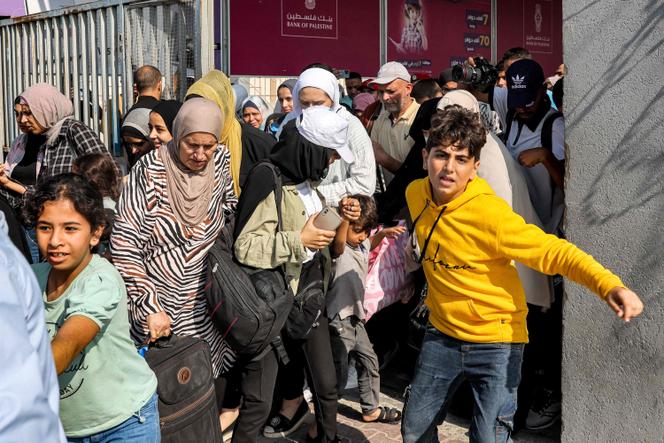


Before heading for the Rafah border crossing in the early hours of the morning of Wednesday, November 1, French archaeologist René Elter, trapped in the deluge of Israeli fire that has been raining down on Gaza for over three weeks, like more than 2 million Palestinians in the enclave, "hugged the colleagues who were still there. It was very difficult, but we had to leave."
The hours that followed at the crossing point between Gaza and Egypt were chaotic: The border post, crowded with people, opened later than announced. "People were fighting. You could feel the anguish, the pain, the fear. They didn't want to stay in the hell that is Gaza today. They feared that if they didn't get through on Wednesday, they'd have to stay put, they'd have to re-register [on the lists of nationals authorized to evacuate to Egypt] and therefore have to wait even longer. The [Palestinian] officials were overwhelmed. There were hundreds of passports on their tables," said Elter, who has been working for years in Gaza on projects funded by the NGO Première Urgence Internationale. He also saw "an enormous number of ambulances," which took up another corridor.
For the first time since the start of the war in Gaza, following the Hamas attack on Israel on October 7, wounded people were able to leave the narrow, heavily bombed territory. Most were transported to Arish, a Sinai town near Rafah. Palestinians with dual nationality and foreigners were welcomed on the Egyptian side by diplomatic delegations. Among them were five French nationals – the archaeologist and four aid workers from the NGO Doctors Without Borders – as well as Italians, Japanese and Americans. But because of the chaos and the cumbersome identity verification process, only some of the 500 or so people authorized to cross the border were able to do so. Operations were due to continue on Thursday.
After several weeks of confusion, the United States took credit for the success of the evacuations. President Joe Biden said his country had played a "leading role" and thanked "our partners in the region, particularly Qatar." On Sunday, he held talks with Israeli Prime Minister Benjamin Netanyahu and Egyptian President Abdel Fattah el-Sisi.
In the early days of the war, Egypt said it was open to receiving wounded Palestinians on its soil. But it had made the entry of dual nationals conditional on access for humanitarian aid to Gaza, accusing Israel, which has declared a total siege on the enclave, of obstructing it. Israeli strikes, which occurred on several occasions in the vicinity of the border crossing, also paralyzed the movement. Convoys have been entering since October 21, but humanitarian aid workers are denouncing the inadequacy of this aid, some of which is held up during Israeli searches at the Nitsana checkpoint, some 50 kilometers from Rafah. In all, some 250 trucks have entered the Gaza Strip over the past three weeks – compared with around 500 a day before the war.
You have 65% of this article left to read. The rest is for subscribers only.
